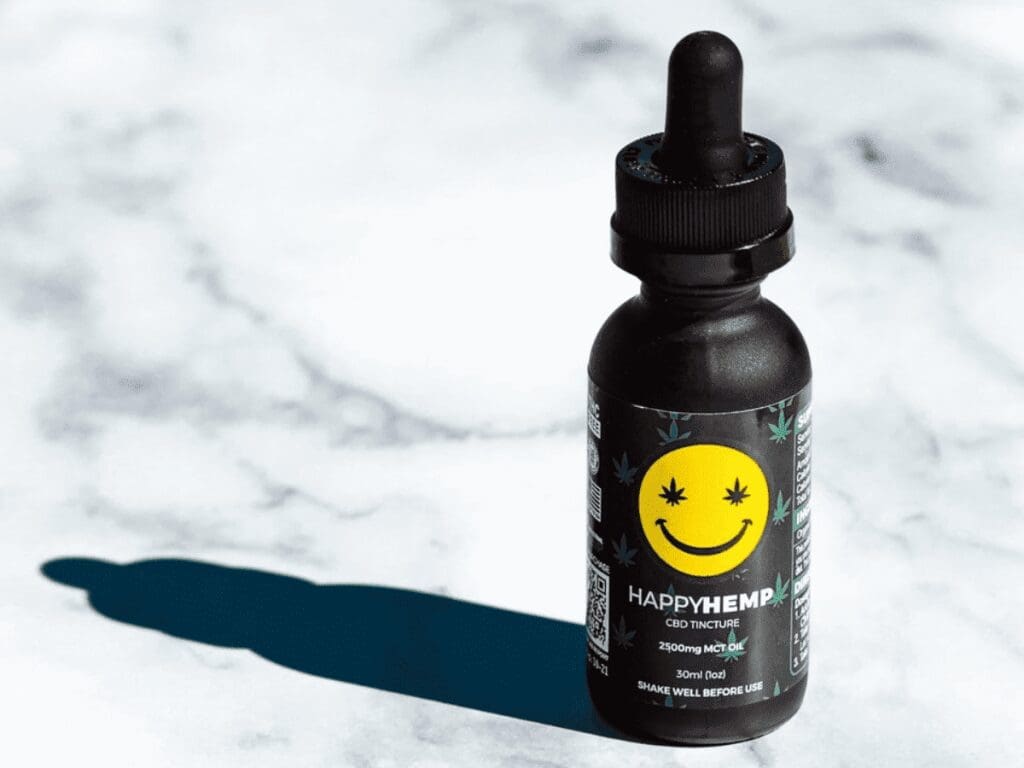Key Takeaways:
- Natural and Holistic Approach: CBD oil addresses nausea through its interaction with the endocannabinoid and serotonin systems, offering a natural, holistic option for relief.
- Versatile Application Methods: With various methods of application including oral ingestion, sublingual administration, and topical application, CBD oil provides flexibility in how it can be used for nausea relief.
- Legal and Safety Considerations: Understanding the legal status of CBD oil, its side effects, and considerations for travel and usage with other medications is essential for safe and effective use. For those looking into CBD oil for nighttime relief, Happy Hemp’s Hemp Oil CBD Tincture, formulated specifically for night use, might offer the safety and efficacy you’re seeking, aligning with responsible usage practices.
CBD oil, derived from the hemp plant and known for its therapeutic effects, has emerged as a sought-after remedy for nausea. This ailment, whether due to medical conditions, chemotherapy, or motion sickness, can disrupt daily life and well-being. CBD oil has attracted attention for its ability to offer natural relief from nausea. This guide examines CBD oil’s benefits, application methods, and its effectiveness in managing nausea, providing a hopeful option for those interested in natural wellness and the health advantages of hemp. We highlight the comforting potential of CBD oil, aiming to guide readers towards improved comfort and well-being.
For those intrigued by the therapeutic effects of CBD oil for nausea, Happy Hemp’s MCT CBD Oil Tincture could be a natural, fast-acting solution. Formulated for quick relief and easy incorporation into daily routines, it’s designed to enhance well-being discreetly and efficiently.
Experience The Happy Hemp Difference
Why wait to feel good? Visit Happy Hemp now to explore our full collection and find the CBD product that’s right for you. It’s your time to thrive, naturally. |
Understanding Nausea And Its Causes
Gastrointestinal Issues
Many cases of nausea originate from the gastrointestinal tract. Conditions such as food poisoning, gastritis, and stomach flu directly affect the stomach and intestines, leading to the uncomfortable sensation of wanting to vomit. Understanding these conditions is crucial, as they often require specific treatments alongside nausea management.
Systemic Conditions
Nausea isn’t limited to the digestive system; it can also be a symptom of systemic conditions such as migraines, pregnancy (often referred to as morning sickness), and reactions to medications. These instances highlight the body’s interconnected nature, where disturbances in one system can manifest symptoms elsewhere, including the gastrointestinal tract.
Sensory Inputs And Psychological Triggers
External stimuli like unpleasant smells or sights can also trigger nausea, a phenomenon often experienced in motion sickness. Similarly, stress and anxiety are potent psychological triggers, demonstrating the mind-body connection in the experience of nausea. These triggers underscore the importance of holistic approaches to managing nausea, which consider both physical and mental health.
The Interplay Between The Brain, Stomach, And Other Organs
The complexity of nausea lies in its roots in both the nervous and digestive systems, implicating a network of signals between the brain, stomach, and other organs. This interplay is crucial for understanding how and why nausea occurs, informing more targeted approaches to management and treatment.
The Science Behind CBD Oil And Nausea Relief
Interaction With The Endocannabinoid System
The ECS consists of two primary receptor types, CB1 and CB2, which are found throughout the body, including in the brain and digestive system. CBD is thought to interact indirectly with these receptors, particularly affecting the CB1 receptors in the brain that influence the vomiting center. By modulating the activity of these receptors, CBD oil can potentially reduce the feeling of nausea and suppress the urge to vomit.
Serotonin Receptor Modulation
CBD oil may alleviate nausea by targeting serotonin receptors, particularly the 5-HT1A receptor. Serotonin, a neurotransmitter linked to well-being, also impacts gastrointestinal functions like nausea and vomiting through the gut-brain axis. By influencing these receptors, CBD can help reduce serotonin release that triggers nausea, providing a natural solution for relief.
Anti-Inflammatory Effects
CBD’s anti-inflammatory properties also contribute to its potential effectiveness in nausea relief. Inflammation in the gut can exacerbate nausea; by reducing this inflammation, CBD oil may help mitigate the intensity and frequency of nausea episodes.
As CBD’s anti-inflammatory properties offer hope for those seeking relief from nausea, incorporating Premier Hemp CBD Extra Virgin Olive Oil into your routine could provide a unique, natural solution.

Evidence From Research And Studies
Emerging research supports the use of CBD oil for nausea. Several studies have highlighted its effectiveness, particularly in chemotherapy-induced nausea, a common side effect experienced by cancer patients. These findings underscore the potential of CBD oil as a complementary treatment for nausea, offering hope to those looking for natural and effective remedies.
How To Use CBD Oil For Nausea
Oral Ingestion
One of the most common methods for taking CBD oil is orally, either through CBD capsules, edibles, or by adding the oil directly to food or drinks. This method is particularly beneficial for those who prefer a straightforward, measurable approach to dosage. When ingested, CBD oil passes through the digestive system and is metabolized by the liver, with its effects typically felt within one to two hours.
Sublingual Administration
For quicker absorption, CBD oil can be taken sublingually, or under the tongue. This method allows CBD to enter the bloodstream more directly, bypassing the digestive system for faster onset of effects, usually within 15 to 30 minutes. Sublingual administration is especially useful for those needing immediate relief from sudden onset of nausea.
Topical Application
While less common for nausea relief, CBD can also be applied topically through creams and lotions. This method is ideal for localized issues but may also offer indirect benefits for nausea, particularly if stress or anxiety triggers it, by promoting relaxation and reducing overall tension in the body.
Dosage And Considerations
Determining the correct CBD oil dosage is essential and depends on personal factors like weight, metabolism, and nausea severity. Start with a low dose and adjust gradually to find your optimal level. Always consult a healthcare professional before using CBD oil, particularly if you’re on other medications, to guarantee safety and effectiveness.
Choosing The Right CBD Oil For Nausea Relief
Source Of Hemp
Quality begins with the source. Look for CBD oil derived from organically grown hemp, as this minimizes exposure to pesticides and chemicals. Products sourced from reputable locations known for their hemp production standards, such as the United States or certain European countries, are often a good indicator of quality.
Extraction Method
The method used to extract CBD oil from hemp plants can impact the purity and effectiveness of the final product. CO2 extraction is widely regarded as the gold standard, as it ensures a clean, solvent-free oil rich in CBD and other beneficial cannabinoids and terpenes.
Spectrum Of The Extract
CBD oil comes in three main types: full-spectrum, broad-spectrum, and CBD isolate. Full-spectrum oils contain all the natural compounds found in hemp, including trace amounts of THC, which may enhance the therapeutic effects through the entourage effect. Broad-spectrum oils offer a THC-free option while still including other cannabinoids and terpenes. CBD isolate is pure CBD, best for those who need to avoid THC entirely.
Potency
The potency of CBD oil, measured in milligrams of CBD per bottle or per dose, is a critical factor in its effectiveness for nausea relief. Higher potency does not always mean better, especially for beginners. Start with a lower potency oil to gauge your body’s response before considering a higher concentration.
Third-Party Testing
Always choose a product that has been independently tested by third-party laboratories. These tests verify the CBD content and potency, and screen for contaminants such as pesticides, heavy metals, and molds. Reputable brands will provide access to these test results, often through their websites.
Reviews And Recommendations
Reading reviews from other consumers can provide insight into the effectiveness of a CBD oil for nausea relief. Additionally, recommendations from healthcare professionals or trusted sources can guide you towards high-quality products.
Safety And Legal Considerations
Safety Profile Of CBD Oil
CBD is usually safe with a good safety profile, causing only mild side effects like dry mouth, drowsiness, and changes in appetite or weight for most users. Individual reactions and drug interactions are critical considerations, as CBD can alter the metabolism of some medications similarly to grapefruit. Therefore, consulting a healthcare provider before using CBD oil, particularly when taking other medications, is essential.

Legal Considerations
The legal status of CBD oil varies by country and, in some cases, by state or region within a country. In many places, CBD derived from hemp (containing less than 0.3% THC) is legal, but products derived from marijuana or containing higher levels of THC may be restricted. It’s important to research the specific laws in your area regarding CBD and THC content to ensure compliance with local regulations.
Purchasing And Possession
When buying CBD oil, choose reputable sellers that offer product testing and disclose ingredients, ensuring legality, quality, and safety. In regions with strict cannabis laws, possession of CBD oil could be legally scrutinized, so retaining documents such as certificates of analysis (COAs) is advisable for verification.
Travel Considerations
Traveling with CBD oil requires caution, as laws regarding CBD can vary significantly between destinations. Before traveling, verify the legal status of CBD in your destination and consider leaving your CBD products at home if you’re unsure of the legal landscape.
Final Thoughts
CBD oil presents a natural and holistic approach to managing nausea, offering relief by engaging with the body’s own endocannabinoid and serotonin systems to ease discomfort. Beyond merely addressing the physical symptoms, it encapsulates a broader embrace of wellness, recognizing the integral role of psychological well-being in overall health. As a testament to the healing powers of nature, CBD oil encourages a mindful and informed approach to health, advocating for a balance between the mind and body in the pursuit of relief and well-being.
In the quest for a balanced approach to managing nausea, the JustCBD Honey Tinctures offer a sweet, natural alternative. Infused with the soothing qualities of CBD and the natural sweetness of honey, these tinctures provide an enjoyable way to incorporate the benefits of hemp into your daily wellness routine.
Read Also:
- Combat Nausea Naturally With CBD – Your Guide To Relief
- PTSD Relief Through CBD: A Comprehensive Guide
- Boost Your Focus Naturally With CBD
Frequently Asked Questions
What makes CBD oil a good choice for managing nausea?
CBD oil interacts with the body’s endocannabinoid system and serotonin receptors, potentially reducing nausea and vomiting by modulating the signals that trigger these sensations. Its natural origin and the holistic approach to wellness make it a compelling option for those seeking alternatives to traditional medications.
Can CBD oil be used for all types of nausea?
CBD oil may offer relief for various causes of nausea, including chemotherapy-induced nausea, nausea related to gastrointestinal issues, and nausea stemming from systemic conditions. However, the effectiveness can vary depending on the individual and the underlying cause.
Are there any side effects associated with using CBD oil for nausea?
CBD oil is generally well-tolerated, with mild side effects like dry mouth, drowsiness, and changes in appetite or weight for some users. It’s essential to start with a low dose and consult a healthcare professional, especially if you’re taking other medications.
How quickly can I expect relief from nausea after taking CBD oil?
The onset of relief depends on the method of administration. Sublingual use can offer effects within 15 to 30 minutes, while oral ingestion may take one to two hours. Individual responses can vary based on factors like metabolism and the severity of nausea.
Is CBD oil legal and safe to travel with?
The legality of CBD oil depends on its THC content and the legal status in the specific location. In many places, hemp-derived CBD oil with less than 0.3% THC is legal. When traveling, it’s crucial to check the laws of your destination regarding CBD.
How do I choose the right CBD oil for nausea?
Look for CBD oil from organically grown hemp, extracted using CO2 methods, and tested by third-party labs. Consider whether you prefer full-spectrum, broad-spectrum, or isolate based on your THC tolerance and health goals.
What’s the best way to use CBD oil for nausea?
The best method can depend on your preference and the urgency of relief needed. Sublingual administration offers quick relief, while oral ingestion is suitable for longer-lasting effects. Consultation with a healthcare professional can help determine the best approach for you.
Can CBD oil help with nausea caused by anxiety or stress?
Yes, by potentially reducing anxiety and stress, CBD oil may indirectly relieve nausea triggered by these psychological factors. Its calming effects on the nervous system can be beneficial for those whose nausea is linked to anxiety.
Are there any interactions between CBD oil and other medications I should be aware of?
CBD oil can interact with certain medications in a way similar to grapefruit, affecting how drugs are metabolized by the body. Always consult with a healthcare professional before combining CBD oil with other medications.
Can children or pregnant women use CBD oil for nausea?
The use of CBD oil in children and pregnant women is a topic that requires careful consideration and consultation with a healthcare provider. The safety and efficacy of CBD in these groups have not been thoroughly studied.
Sources:
- Story, G., Briere, C.-E., D. Julian McClements, & Sela, D. A. (2023). Cannabidiol and Intestinal Motility: a Systematic Review. Current Developments in Nutrition, 7(10), 101972–101972. https://doi.org/10.1016/j.cdnut.2023.101972
- Atalay, S., Jarocka-Karpowicz, I., & Skrzydlewska, E. (2019). Antioxidative and Anti-Inflammatory Properties of Cannabidiol. Antioxidants, 9(1), 21. https://doi.org/10.3390/antiox9010021
- Kicman, A., & Toczek, M. (2020). The Effects of Cannabidiol, a Non-Intoxicating Compound of Cannabis, on the Cardiovascular System in Health and Disease. International Journal of Molecular Sciences, 21(18), 6740. https://doi.org/10.3390/ijms21186740







